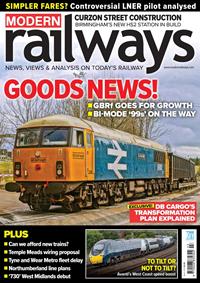|
|
NewsFront
Informed Sources - NSE modernisation derailed; Regional electrification
Diary
ZOrich's S-Bahn - A co-ordinated urban railway
Worldview
Overseas news
Review
Provincial into Regional — What's in a Name? - Regional Railways' Managing Director sets out his stall
Cross-City Electrification - Background to the West Midlands project
Commuter Rail in North America - Survey concludes with a state of the nation assessment
News Briefing - Speedlink optimism
Service Please - A view of consumer representatioi
Rail Tourer
Moving Wheels - Traffic news
Trackwatch - Our unique infrastructure survey
Forum - Letters to the Editor
Alan Williams
Cover - A Portsmouth-bound Class 155 Super-Sprinter leaves the Great Western main line at Bathampton, near Bath, in July 1990. Conversion of these trains to single-car units forms a centrepiece of the strategy of ' Regional Railways, as discussed in this issue.
Regional Railways' Managing Director Gordon Pettitt has some straightforward messages to deliver in our interview with him on p635.
The source of funding is less important than professional delivery of the service the new business is there to provide, he emphasises. On this point, in a startling consensus which reflects the new priority attached to transport, political opponents all demand reliability and quality of service of Regional Railways. We are all customers now, it seems.
On the vexed question of just what the Public Service Obligation is all about, Gordon Pettitt sees little chance of additional subsidy, but would otherwise not be drawn into the political controversy. As an executive, his attempts to balance Regional Railways' books, partly by distributing available resources to meet demand, are entirely consistent and professional.
So his position no doubt accurately reflects the requirements of BR's political masters. But the argument is heating up between local councils, unhappy at cuts in service which they are explicitly or implicitly invited to reverse through funding, and the Government, at whose door the buck stops on the contradictory directions to BR: to maintain PSO services but cut PSO funds. It is clear which imperative is taking precedence in practice: BR is clearly out to deliver a £345 million railway to fit the £345 million grant target by 1992. In this context, reflect on Gordon Pettitt's comment that Regional Railways needs good understandings about what is required of it. On the rural railway, they don't exist at present, and may be a long time coming, given the antipathy between Government and many local authorities: the Monopolies & Mergers Commission suggestion of devolving the PSO to new, shire Passenger Transport Authorities is something of a hot potato in the context of the Community Charge, and when the existing PTAs are a vestige of a tier of local government which was dismantled by the present central government.
Any managing director needs to know what is expected of him, and Regional Railways' sails seem set to fulfil those expectations which are clear. But, as the Monopolies Commission
again noted, the basis of Regional Railways' activity, its funding arrangements, cry out for overhaul: as reflected in the interview with Gordon Pettitt, the PTE as well as the PSO legislation isn't up to the job. If you are a transport minister not prepared to find money to maintain rural services, this is quite possibly to your advantage: but it is bad news for the consumer if neither transport ministry nor the BR Board will take the role of professional advocate for railways. For there isn't anyone else.
But in the absence of some boat-rocking from the BR Board, or of an overwhelming reason for the Government to bother about sorting the PSO out. Regional Railways' devolved approach is praise-worthy, reflecting the place of railways on local agendas. Emphasis on quality of service is imperative if rail is to have a snowflake's chance against the private car. The detailed structure of the organisation will still require careful thought to ensure that the differing requirements of the natural divisions of the business into 'deep' rural, inter-city, and urban components are met. The new regional directors' territories are very unequal when one takes this balance into account.



